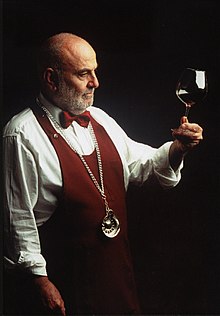 Bl. Pope John XXIII once said that men were like wine, some turn to vinegar and the best improve with age. Relying on God for His Divine Assistance, I hope that I might become a wine pleasing to Him. Secondly, the wise men are those who can taste the difference between good and bad wine, figuratively speaking.
Bl. Pope John XXIII once said that men were like wine, some turn to vinegar and the best improve with age. Relying on God for His Divine Assistance, I hope that I might become a wine pleasing to Him. Secondly, the wise men are those who can taste the difference between good and bad wine, figuratively speaking.Don't believe me? The word wisdom in Latin is "sapientia." The root of the word is "sapio, sapere" meaning to taste or understand. The two notions tasting and understanding are inextricably connected. In the same way that a person who has had many experiences in life and taken the time to understand those experiences and why they happened the way they did, a person who has drunk many different wines and taken the time to understand the subtle differences can become a true sommelier. This sommelier when asked, "What wine ought I to have with this meal?" can easily recommend the perfect wine. The wise man, similarly, can recommend to the inexperienced an appropriate course of action.
The skill of being able to taste the subtleties of food and drink has always been the perfect analogy for wisdom. The most famous taste experts are those of wine, the sommelier or wine steward. For this reason, I found wine á propos to the name of this blog and "like" fits á double entente to make the title mean two quite inextricably related things, men appreciate wine and men are similar to wine. And if this is the case, then it follows that men who appreciate wine in the figurative sense are men who improve with age.
Cheers!

Greetings,
ReplyDeleteJust a quick question regarding your article, "Five Signs We Get Wrong at Mass." My question is about the following quote you cite:
"A bow of the head is made when the three Divine Persons are named together and at the names of Jesus, of the Blessed Virgin Mary, and of the Saint in whose honor Mass is being celebrated."
My question pertains specifically to the last part. Does "the Saint in whose honor Mass is being celebrated" mean the deceased for whom Mass is offered?
If you could get back to me on that at your convenience, I would greatly appreciate it. Thank you for your time, and God bless.
The Saint in whose honor Mass is being celebrated is in reference to the feast day, solemnity, commemoration, and so forth. It is not a reference to the deceased for whom Mass is offered. Good question. Thanks for reading.
Delete